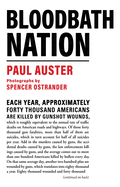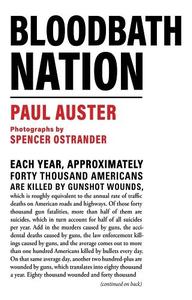
 So much has been written about gun violence in the U.S., a country that buries 40,000 of its own as a result of gunshot wounds each year, that it's fair to question whether there could be a new way to look at the problem. Taking a crack at it is Paul Auster (The New York Trilogy; Report from the Interior), whose Bloodbath Nation is deft and dogged and entirely too contemplative to be a screed, even at its febrile peak.
So much has been written about gun violence in the U.S., a country that buries 40,000 of its own as a result of gunshot wounds each year, that it's fair to question whether there could be a new way to look at the problem. Taking a crack at it is Paul Auster (The New York Trilogy; Report from the Interior), whose Bloodbath Nation is deft and dogged and entirely too contemplative to be a screed, even at its febrile peak.
The book is a multipart essay chronicling the nation's fixation with guns, and it begins with one particular citizen's fixation: "For two or three years after emerging from diapers, I walked around with a six-shooter dangling from my hip." (Auster means the toy version.) Accounts of his personal experience with guns merge with sociological observations and a partial inventory of mass shootings in the U.S. Auster is sparing with his vitriol, largely reserving it for gun culture: "the annihilation of strangers has been turned into both a competitive sport and a sinister new variant of contemporary performance art. It is America's latest gift to the world, a psychopathic footnote to such previous wonders as the incandescent lightbulb, the telephone, basketball, jazz, and the vaccine against polio."
And yet throughout the book, Auster seems to be not so much in a state of rage as genuine perplexity. About the only-good-guys-with-guns-can-save-bad-guys-with-guns argument, he writes in what seems like true puzzlement, "If the problem is too many bad men with guns, would it not be wiser to take those guns away from them rather than arm the so-called good men, who in many if not most instances are considerably less than good, and thereby eliminate the problem altogether, for if the bad men had no guns, why would the good men need them?"
Will the message of Bloodbath Nation reverberate outside the echo chamber of Auster's fellow gun-control advocates? His generally measured tone makes it seem possible. Also potentially persuasive are several dozen black-and-white photographs by previous Auster collaborator Spencer Ostrander (Long Live King Kobe), who has visited many of the sites of mass shootings in the U.S. since 2003--a Macy's in Washington State, a schoolhouse in Pennsylvania and so on. The buildings, shops and restaurants--closed, abandoned, often since torn down--cluster moment-of-silence-like between chapters and embody a feeling that Auster notes is commonly shared by shooters: loneliness. --Nell Beram, author and freelance writer
Shelf Talker: Paul Auster's look at the tragedy of gun violence in the U.S. is deft and dogged and entirely too contemplative to be a screed, even at its febrile peak.

